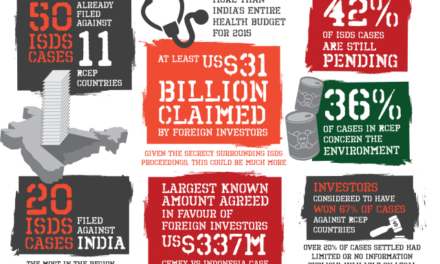As civil society groups from all over the world are gearing up for their organised demonstrations at Seattle opposing a new round, developing governments, too, have been looking at what shape the negotiations at Seattle and beyond should take.
This was the objective of a recent G15 meeting of developing country governments in Bangalore 17-18 August. Southern governments met to establish solidarity and to forge common objectives for the WTO’s Third Ministerial Conference.
There was unanimity amongst the governments that their highest priority at the Seattle Ministerial would be the resolution of developing countries’ implementation issues and the ‘removal of inequities in the existing agreements to restore the balance of rights and obligations forged in the Uruguay Round’. Governments felt very strongly that ‘mandated negotiations and mandated reviews should constitute the core agenda for the next round of negotiations’.
Two other features of implementation were also highlighted
– the non-realisation of benefits by many developing countries in areas of interest to them, such as agriculture and textile and clothing, and therefore the need for developed countries to fulfil their obligations in spirit;
– the Special and Differential provisions in the Uruguay Round Agreements which have remained unimplemented. These must be operationalised.
Some of the governments gathered were prepared for limited add-ons such as tariff negotiations. Governments, however, emphasised that they did not want the agenda overloaded.
Unfortunately, there seemed to be a shift in India’s position from an adament ‘no’ to a new round it had previously articulated, to a more ‘wait and see’ position. Commerce minister, Ramakrishna Hedge told the media that ‘We do not want to be seen as an opponent to new issues but we want to be cautious’ (The Economic Times 19 August 1999).
As the leader and champion of the cause of developing countries at the WTO, this change in India’s position has implications for the other developing countries.
What is behind this change and what are the implications?
Road-map of the Built in Agenda and New Issues
The WTO’s Second Ministerial Conference in May 1998 identified four building blocks for the future work programme of the WTO. The General Council has been asked to make its recommendations on them, on the basis of consensus, at the Third Ministerial Conference at Seattle. The four building blocks are:
Implementation of Existing Agreements (usually known as the ‘built-in agenda’)
a) Problems, issues and concerns arising from the implementation of the existing agreements (eg. expected benefits which have not been forthcoming such as in textiles and clothing, agriculture; abuse by some countries of antidumping and countervailing measures etc).
b) Mandated negotiations under the existing agreements, such as in agriculture and services
c) Mandated reviews of existing agreements: TRIMS, TRIPS.
New issues arising from the previous Ministerial Conferences
From the Singapore First Ministerial Conference (December 1996)
a) Trade and investment
b) Trade and competition policy
c) Transparency in government procurement practices
d) Trade facilitation
From the Second Ministerial Conference (Geneva, 1998): e) Global electronic commerce
Implementation of the decisions taken at the High Level Meeting on Least Developed Countries (LDCs)
Other new issues to be decided by consensus:
a) Industrial tariffs (unlike the others on this list, this is not a ‘new issue’, but it is new in that it does not fall under the mandated built in agenda).
b) Trade and environment
c) Trade and labour standards
d) Transparency in WTO’s work process
e) Global free logging agreement
f) Genetically modified products
EU, US and Developing Countries’ Positions: There are several positions to date on how to move forward in the future work programme.
The EU and its allies are pushing hard for a broad round of negotiations at the WTO. The EU has repeated its thinly veiled threat that it will consider negotiations in agriculture only if there is an ambitious and comprehensive trade round. At the top of the EU’s agenda in the new round are further cuts in industrial tariffs, and, importantly, binding multilateral rules on foreign investment.
Further liberalisation in agriculture is extremely sensitive on the domestic front, in countries such as the EU and also in Japan. A comprehensive round including investment would help diffuse tensions amongst their domestic lobbies should they make compromises in agriculture.
The US has been less enthusiastic about negotiations based on a single undertaking (negotiations on an issue is concluded only when all negotiations are concluded). They have been pushing for an ‘early harvest’, where issues can be completed without having to wait for the completion of all other issues. The reason for their hesitance towards a broad agenda is that they do not want difficult fundamental questions about the TRIPS agreement to be brought up by the developing countries, such as its basic contradictions with the Convention on Biodiversity.
Implementation concerns have and will continue to be the priority of developing countries. Until prior to the G15 meeting, developing countries had been resolutely stating that only the built-in agenda, with perhaps the inclusion of industrial tariffs should be on the agenda. Many of the market access benefits they had expected from the last round did not materialise, and therefore, the focus of future negotiations should be on redressing imbalances, instead of pushing ahead on new issues.
To Have or Not to Have A New Trade Round: Is it the Right Question?
As the governments were debating in Bangalore, a group of civil society representatives were also holding a parallel meeting on the same issues, organised by the Consumer Unity and Trust Association (CUTS). Former foreign secretary and trade veteran, Muchkund Dubey led the debate there about the pros and cons of a new trade round.
The main reason to oppose a new round with new issues is that many developing member countries are not even equipped to keep pace with the built-in agenda. It would be extremely difficult, if not impossible for them to keep apace with the negotiations if more subjects are brought on board.
Conversely however, Dubey cited recent examples showing that even without a trade round, new issues have constantly been brought up and put on the agenda by developed countries. For example, the information technology agreement was agreed upon in Singapore, after the US used the APEC forum to get an initial consensus on it.
Similarly, at the second ministerial, the surprise waiting for developing countries was the declaration endorsing a standstill in tariffs on electronic commerce.
At the same time, issues of interest to developing countries have not been negotiated. For example, negotiations on the movement of natural persons have not been restarted, even though the first round had brought only very superficial results for developing countries. Developing countries have tried, to no avail, to press for a subsequent round. Likewise, the TRIPS review that was mandated to take place in 1999 has been quietly sidelined because of developed countries’ reluctance to address the sensitive issues of concern to developing countries.
Dubey therefore felt that perhaps, with a trade round, developing countries would have more time to react to the new issues which are brought to the table, rather than be taken by surprise. In the past, this led to developing countries giving in to the Northern agenda without in fact receiving any significant benefits in return.
However, Dubey criticised the argument given by developed countries – that if there is no wider round, there will be no gains for developing countries. This, he said, is blackmail. It is equivalent to saying that developing countries must negotiate on the terms of the North, or else…
At the end of the day, Dubey says, the issue is really not about whether or not there is a new round, but in fact, what goes into the negotiating agenda.
One of the problems about trying to develop a Southern agenda is that countries are interested in different items. It is therefore very difficult, perhaps even impossible to find agreement between developing countries about which items should be included or excluded.
What to make out of all this? One may or may not agree with Dubey, that a new round would be better as developing countries will have more time and will be able to better ensure that their issues are also on the table, so that trade-offs can be made.
This may be a sensible position of one who has taken into account all the political realities. Already, the G15 meeting gave no clear indication of opposing a new round. Some countries may be willing to accept certain new issues in exchange for concessions in key areas of concerns. For India, for instance, one key area could be bringing the TRIPS agreement in line with the Convention on Bio-diversity so that the rights of communities are recognised and patents not granted under the CBD are also not granted under TRIPS.
The key question here, however, is that if new issues proposed by the North are allowed to get on the agenda, and developing countries do want to engage in some of these issues in return for other benefits, where is the point at which the full-stop is drawn? This is a tricky issue given the number of developing countries and their different economic and political interests, and that at the WTO, countries unfortunately attempt only to negotiate for own benefit, irregardless of whether or not this impedes their Southern neighbours’ interests.
In the very short time before Seattle, developing country government may want to ponder on some of the comments by trade experts at a meeting in July at Columbia University, where there was no enthusiasm for a new round and new issues from the most surprising quarters. This included OECD secretary general, Donald Johnston, former WTO director-general Aurther Dunkel, and free trade advocate, Jagdish Bhagwati.
Bhagwati noted that developing countries were now weak due to the financial crisis, and therefore had no bargaining power. It would therefore be questionable whether or not the South would be able to get their issues on the agenda if a trade round encompassing new issues pushed by the North were to be launched. He said that a round with the wrong issues (issues which are irrelevant to trade and which are dominated by the Northern corporate agenda) could bring the WTO down the wrong road, so that a programme of unilateral liberalisation may be better.
OECD chief, Johnston warned that industrialised countries were pushing developing countries to liberalise before they could adjust. He called upon Northern trade negotiators of the North not to be overly influenced by narrow commercial interests.
Arthur Dunkel, who was GATT chief at the time of the Uruguay Round recounted how he had recently chaired an International Chamber of Commerce meeting on the views of business on the new round. He was struck that the views of the business leaders reflected the views of their governments in trade negotiations, which led to ask ‘who is driving the trade policy agenda, governments or business?’ He also said that the WTO should not be overloaded in the next round, with subjects which are not related to the system being taken on board. He advised that a realistic agenda should consist of the built-in agenda and tariffs.
Rubens Ricupero, head of UNCTAD pointed out that whatever the theoretical benefits of trade liberalisation, the empirical record is otherwise. He commented that the majority of diplomats from the South are looking at the new round with resigned fatalism and not enthusiasm. He called for the round to be a Development Round, where the real focus is on the North opening up their markets to products of the developing counties (Suns #2288).
Developing countries must weigh carefully, whether or not they will benefit from another round of trade negotiations, and not be lulled into thinking that a new round will be able to re-balance their interests. Trade negotiations are a slippery slope which developing countries have found they are usually sliding down rather than making upward progress.
When under pressure to put new issues on the agenda, it may be a good time for developing countries to throw back at the US, the latter’s response to developing countries’ wish to extend the TRIPS Agreement transition period:
‘We haven’t gotten any benefit out of this agreement (the Uruguay Round Agreements) from many countries with whom we negotiated so hard in the Uruguay Round. To now have them say, ‘we should negotiate to make changes before we’ve provided you any benefits’, we find completely unappealing.’
*Aileen Kwa is a research associate with focus on the Global South. She is presently based in Geneva working on the review of the Agreement on Agriculture. A summary of the Bangalore civil society consultation is at the end of this newsletter.









